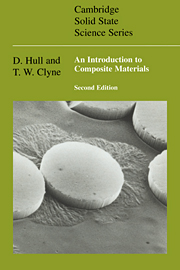Book contents
- Frontmatter
- Contents
- From the preface to First Edition
- Preface to Second Edition
- 1 General introduction
- 2 Fibres and matrices
- 3 Fibre architecture
- 4 Elastic deformation of long-fibre composites
- 5 Elastic deformation of laminates
- 6 Stresses and strains in short-fibre composites
- 7 The interface region
- 8 Strength of composites
- 9 Toughness of composites
- 10 Thermal behaviour of composites
- 11 Fabrication
- 12 Applications
- Appendix: Nomenclature
- Author index
- Subject index
10 - Thermal behaviour of composites
Published online by Cambridge University Press: 05 June 2012
- Frontmatter
- Contents
- From the preface to First Edition
- Preface to Second Edition
- 1 General introduction
- 2 Fibres and matrices
- 3 Fibre architecture
- 4 Elastic deformation of long-fibre composites
- 5 Elastic deformation of laminates
- 6 Stresses and strains in short-fibre composites
- 7 The interface region
- 8 Strength of composites
- 9 Toughness of composites
- 10 Thermal behaviour of composites
- 11 Fabrication
- 12 Applications
- Appendix: Nomenclature
- Author index
- Subject index
Summary
The behaviour of composite materials is often sensitive to changes in temperature. This arises for two main reasons. Firstly, the response of the matrix to an applied load is temperature-dependent and, secondly, changes in temperature can cause internal stresses to be set up as a result of differential thermal contraction and expansion of the two constituents. These stresses affect the thermal expansivity (expansion coefficient) of the composite. Furthermore, significant stresses are normally present in the material at ambient temperatures, since it has in most cases been cooled at the end of the fabrication process. Changes in internal stress state on altering the temperature can be substantial and may strongly influence the response of the material to an applied load. Creep behaviour is affected by this, particularly under thermal cycling conditions. Finally, the thermal conductivity of composite materials is of interest, since many applications and processing procedures involve heat flow of some type. This property can be predicted from the conductivities of the constituents, although the situation may be complicated by poor thermal contact across the interfaces.
Thermal expansion and thermal stresses
Thermal stresses and strains
Data for the thermal expansion coefficients (a) of matrices and reinforcements, as a function of temperature, are shown in Fig. 10.1. Polymers and metals generally expand more than ceramics. It can be seen that the differences in expansivity between fibre and matrix are large in many cases.
- Type
- Chapter
- Information
- An Introduction to Composite Materials , pp. 237 - 270Publisher: Cambridge University PressPrint publication year: 1996
- 1
- Cited by



